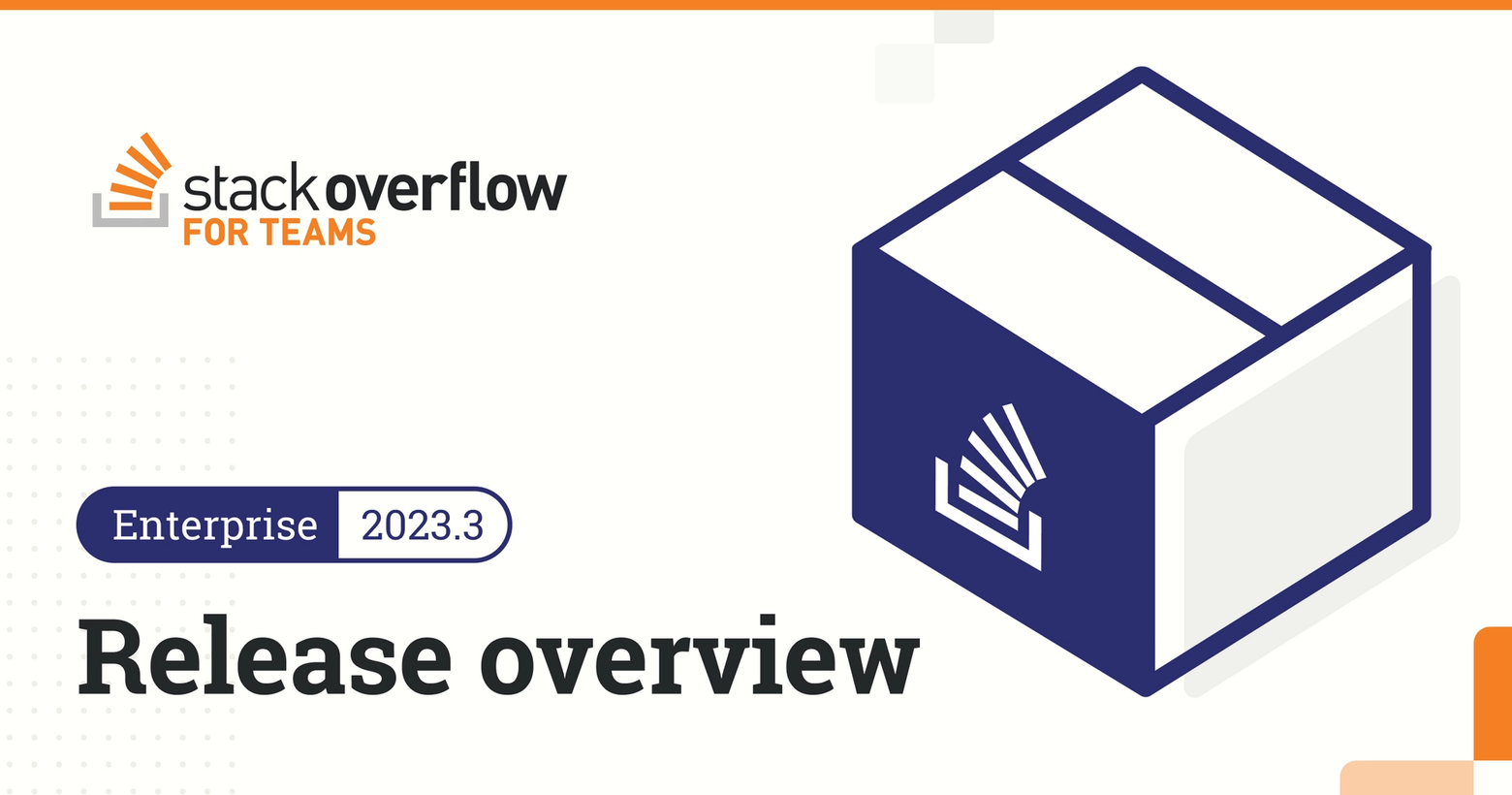This release is anything but basic—you'll see upgrades that give users new and more streamlined ways of interacting with features that are foundational and unique to the Stack Overflow for Teams experience, like tags and voting, while still maintaining their core value of enabling organic, community-driven knowledge discovery and management.
These enhancements make it easier to foster self-sustaining communities that organically find, contribute, and update the knowledge users need to do more innovative work at your organization. This release will not only augment the SME experience but also allow users to more easily discover and engage with SME knowledge in their existing workflows.
Manage Articles more efficiently and boost engagement
While the question-and-answer (Q&A) format in Stack Overflow for Teams is great for seeking solutions and ideas, teams often need to capture related knowledge that isn’t suited for Q&A, like business decisions, how-to guidance, and announcements. With Articles, you can store this type of long-form documentation in the platform so that it can be voted on, discovered, and maintained alongside questions and answers, reducing context switching and streamlining content management.
In this release, we’re upgrading Articles so you can more efficiently manage their lifecycle, improve content quality, and boost engagement.
Expanded editing permissions
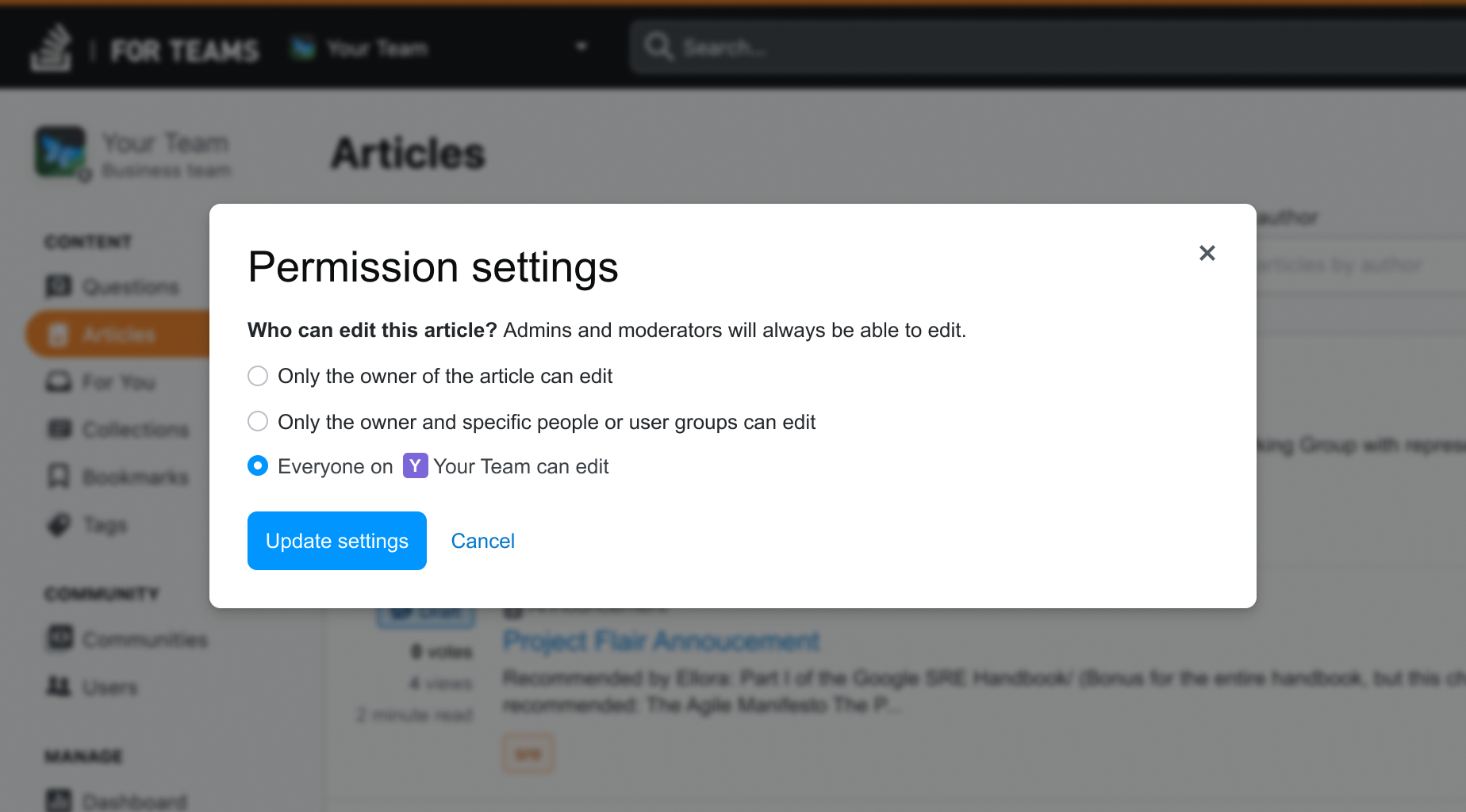
Prior to this release, article authors could grant specific people or User Groups edit permissions. But sometimes it makes more sense to source organic community updates if an article’s contents will change frequently over time. With this release, article authors have the flexibility to grant everyone on their site permission to edit an article. This permission setting is now the default for all newly created articles, but site administrators can change their site’s default permissions if needed.
Slack and Microsoft Teams notifications
With our Slack and Microsoft Teams integrations, Stack Overflow for Teams users can search and capture knowledge without leaving chat and automate channel notifications for relevant questions and answers. To increase article visibility and engagement, users can now automatically notify select Slack and Microsoft Teams channels of newly published articles tagged with relevant topics.
Subject Matter Expert (SME) label
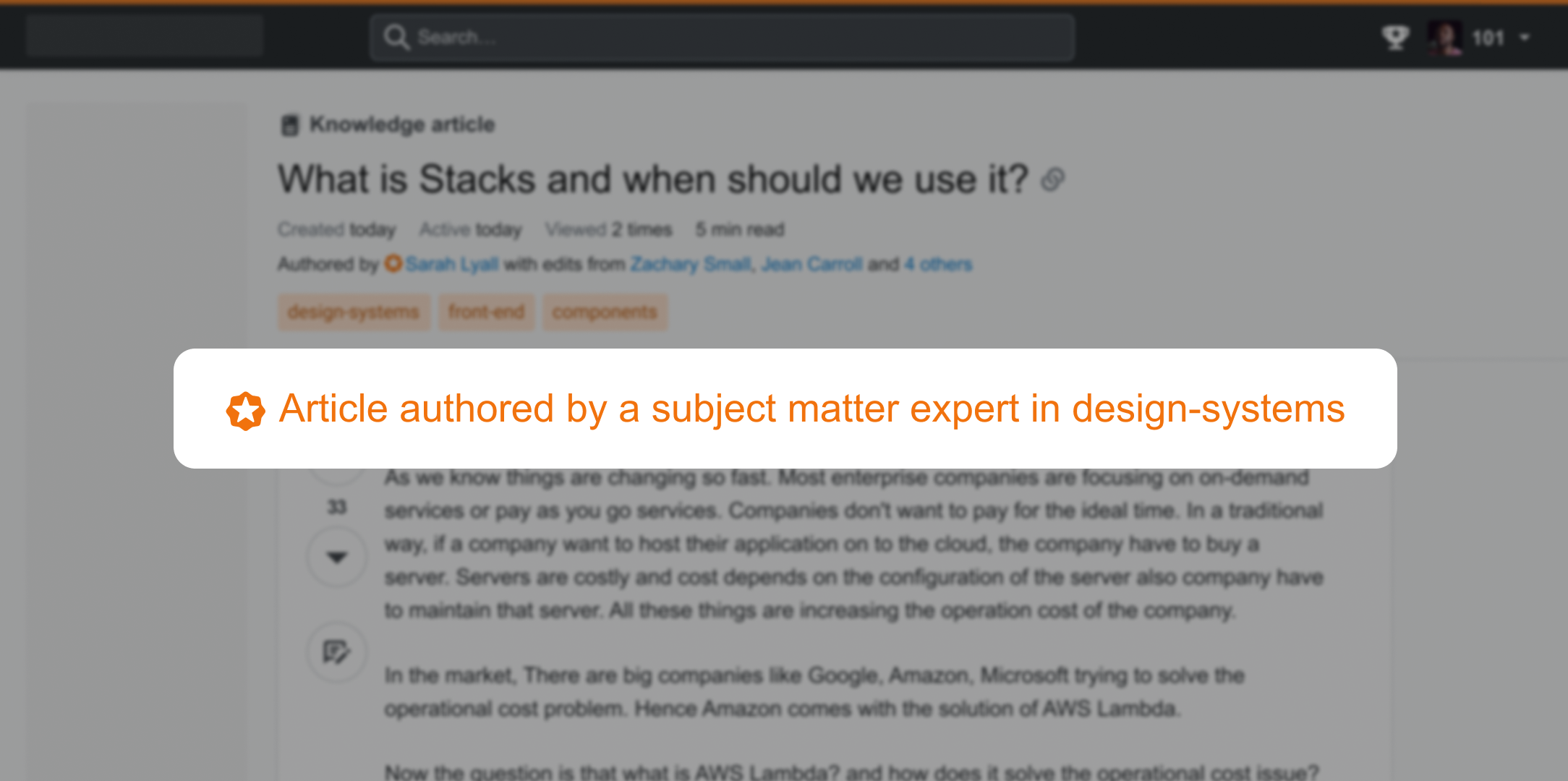
When a question is answered by a Subject Matter Expert (SME) of one of its tags, the label “Answered by a subject matter expert” displays to let users know that the answer came from a trustworthy source. To better surface SME expertise and improve community trust in article content, a similar label now appears on articles when the author is also an SME for one of the article’s tags.
New Articles endpoint
To scale article management even further, we’ve added a new endpoint to the Teams API v3 that allows you to create, edit, and report on your team’s articles.
Speed up time-to-answer with the new Tags page
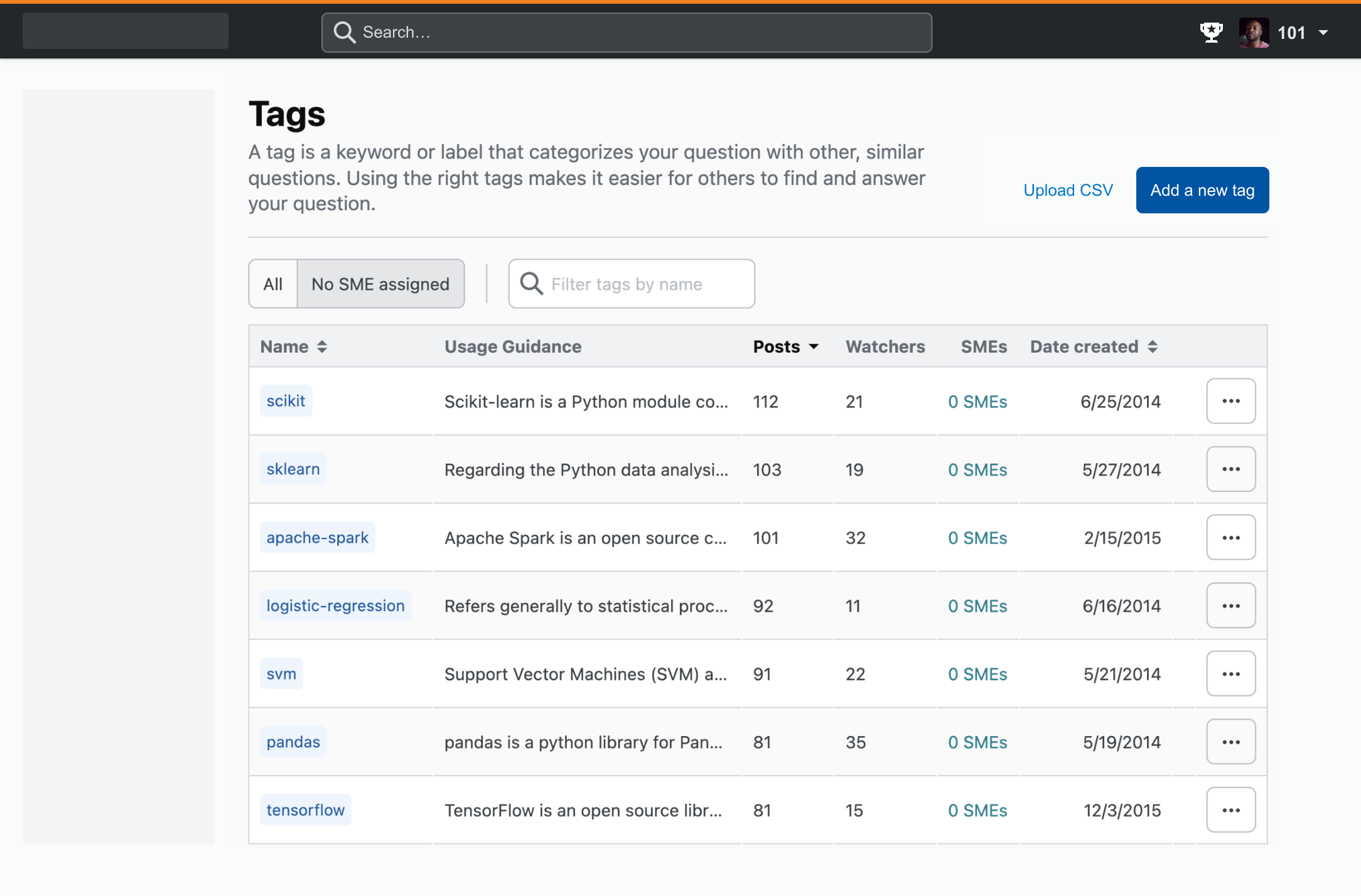
Tags are foundational to how knowledge is organized and discovered in Stack Overflow for Teams and can be used to automatically surface helpful knowledge to users when and where they need it. Since tags also notify Subject Matter Experts (SMEs) of new questions in their areas of expertise, they can help you build a self-sustaining network of domain experts who make their knowledge more accessible to your community instead of answering the same questions over and over again.
“No SME assigned” filter
Apply a “No SME assigned” filter on the Tags page to more easily assign SMEs to tags without one so they start getting notified of new questions and can provide prompt, authoritative answers.
To boost SME engagement and reduce median time-to-answer even more, access these additional insights from the new Tags page:
- Get ideas for which users are the best SMEs for a particular tag by clicking to see who the tag’s top answerers are in the last 30 days and all time.
- Ensure users know when to use or subscribe to your site’s tags by more clearly seeing which ones are lacking usage guidance.
Prevent tag overlap and optimize navigation by seeing if tags with a low number of posts can be merged with a related, more popular tag.
Do more with the Stack Overflow for Teams API
The Stack Overflow for Teams API allows you to integrate your knowledge-sharing platform with other third-party or home-grown applications beyond our out-of-the-box integrations to meet your specific organizational needs. In this release, we’re introducing new data fields and a new endpoint for Teams API v3 to help you continue to extend and enrich Stack Overflow for Teams.
Tags
The tags API endpoint now reports how many users are watching a specific tag. This can be helpful in gauging the popularity of a tag and how much visibility this tag receives. The tags endpoint also:
- Reports on the post count, creation date, and subject matter expert count fields.
- Supports filtering based on whether tags have SMEs or not.
- Supports querying by the partial name of the tag
- Automatically includes SMEs with
/tag/{id}. It’s no longer necessary to make an additional call to/tags/{id}/subject-matter-experts
Answers
The answers API endpoint will now report when an answer is provided by a subject matter expert with an SME label. This can be valuable for a variety of reporting purposes.
Email addresses
The users API endpoint now reports the email addresses of users. Email addresses are often an important identifier when integrating Stack Overflow for Teams with other systems and applications.
Articles
A brand new endpoint for API v3. You can now create, edit, and report on Articles via the API.
Additional updates in the 2023.3 release
Discover more content with new navigation & accessibility updates
A cleaner and better-organized navigation menu helps users discover content and opportunities for engagement that can lead to more action in their organizational communities. This new navigation includes increased visibility of key features, improved accessibility, and more prominent customer brand color.
We’ve also made accessibility updates to the markdown-switching icons in the text editor to appear white when in high-contrast mode. Additionally, the following items now meet WCAG 2 AA contrast ratio thresholds: tags, date and time on Q&A content, “Draft saved” text, and page number and pagination controls.
Get insights into Community activity
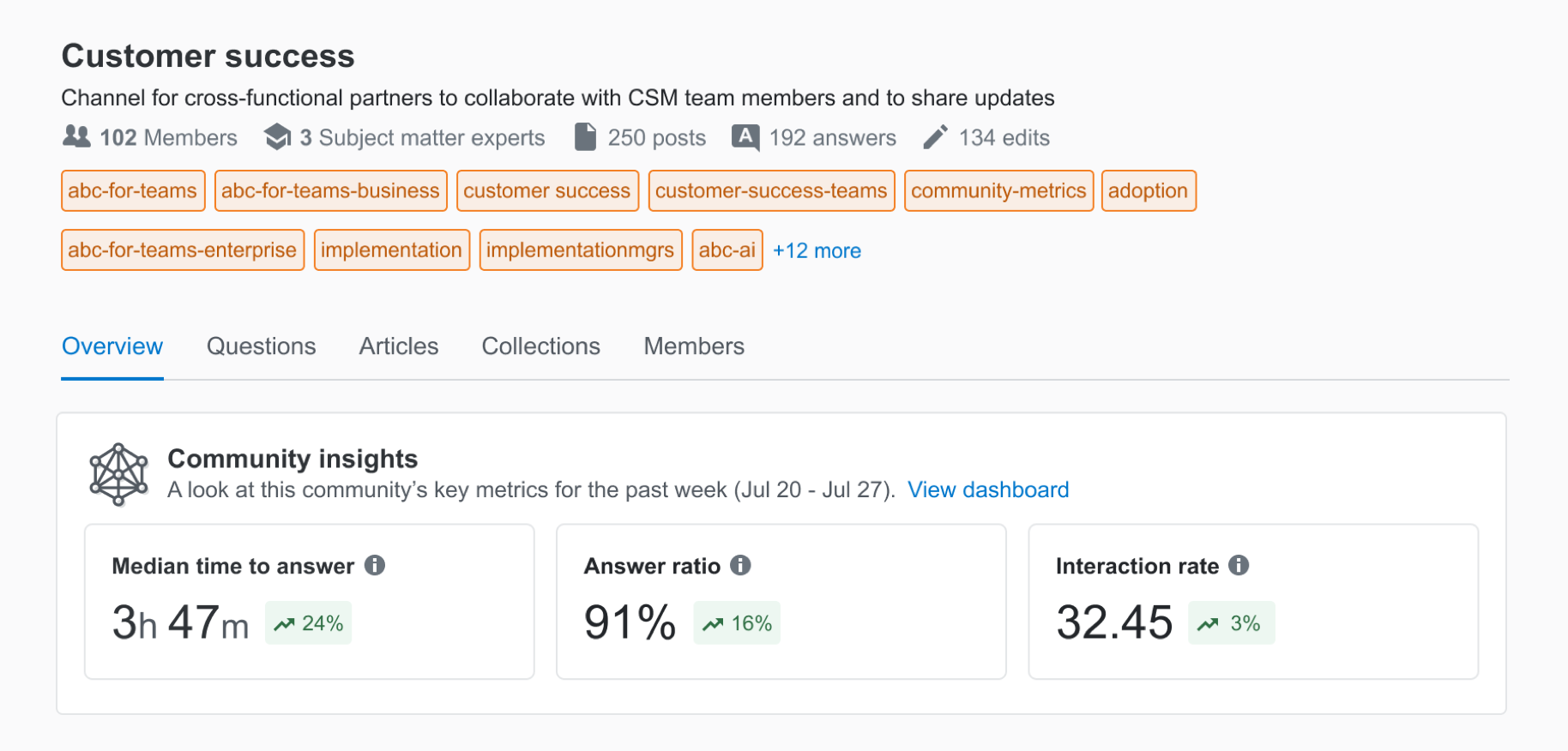
Communities are shared spaces where users utilize a strategic combination of tags to collaboratively learn, share, and solve problems around specific topics or domains. This highly focused collaboration can have a positive impact on platform engagement metrics like median time to answer. An insights widget now displays on a Community’s overview page to showcase its median time to answer, answer ratio, and interaction rate to encourage users to contribute content.
You can now create communities with up to 30 tags to foster collaboration across more topics. This tag increase also applies to the Dashboard where you can now filter by up to 30 tags.
Upvote community content from chat
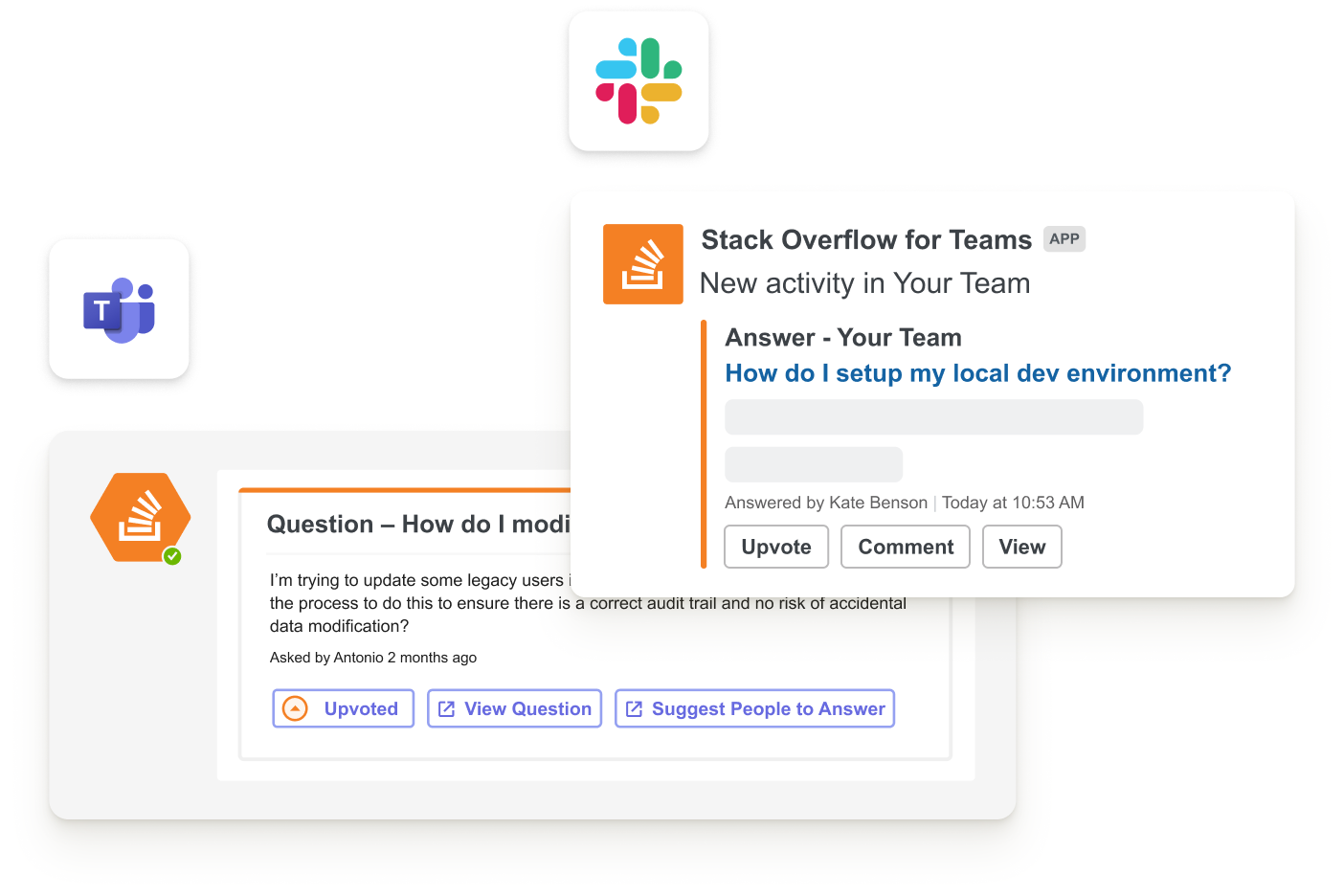
Voting is central to our model of fostering community engagement and quality content contributions. Stack Overflow for Teams users upvote questions and answers to indicate that they’re helpful and boost them to the top of feeds, making them more discoverable. Users who consistently contribute helpful content can accrue reputation points, signaling to the community that they’re thoughtful teammates.
Prior to this release, users could only upvote content from within the platform. Now voting is easier than ever with the addition of an “Upvote” button to Slack and Microsoft Teams notifications. This new functionality allows users to engage with their communities more often without switching apps. These updates will be automatically implemented with the 2023.3 release and no additional update to the chat integration is needed.
Update user roles using SCIM
SCIM integrations can now promote and demote users from regular user, moderator, and admin statuses. A new checkbox on the SCIM management page enables the admin promotion/demotion feature. Previously, the SCIM integrations could manage Moderator and User roles only. This release adds additional functionality to manage the admin role.
For additional details on the improvements above and other updates with the latest release, view the 2023.3 release notes.
